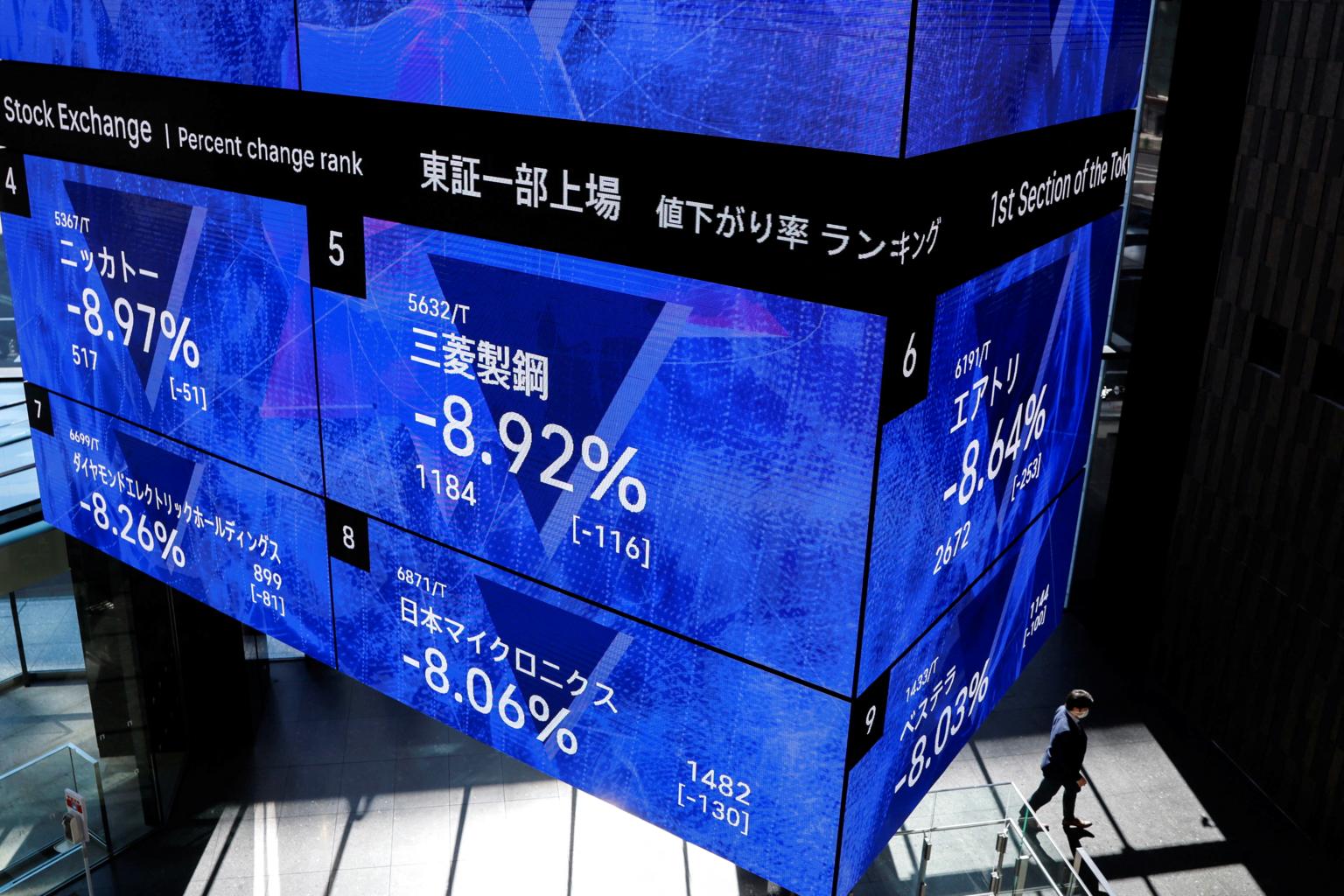Asia stocks sink as oil soars stoking fears of inflation shock
Sign up now: Get ST's newsletters delivered to your inbox

Japan's Nikkei index plunged 3.2 per cent.
PHOTO: REUTERS
SYDNEY (BLOOMBERG) - Asian stocks and US equity futures tumbled on Monday (March 7), while havens including gold and sovereign bonds rose, amid fears of an inflation shock in the world economy as oil soared on the prospect of a ban on Russian crude supplies.
The MSCI Asia Pacific Index, a benchmark Asian stock gauge, was on course for a bear market after tumbling as much as 2.8 per cent on Monday, taking its losses from a record reached in February last year to more than 20 per cent. Technology and consumer discretionary sectors were the worst performers.
Hong Kong’s Hang Seng Index slid 3.3 per cent to its lowest level in almost six years, while the Shanghai Composite Index was down 1.5 per cent. Japan’s Nikkei index lost 3.4 per cent to be among the region’s worst performers.
Australia’s S&P/ASX 200 Index fell 1 per cent and South Korea’s Kospi index dropped 2.2 per cent.
Singapore’s Straits Times Index was down 0.7 per cent at midday.
S&P 500 and Nasdaq 100 contracts fell more than 1 per cent and European futures some 3 per cent.
A surge in oil prices makes some of Asia’s emerging markets such as India, South Korea and Thailand particularly vulnerable given these nations’ dependence on imports to meet their demand. Indian stocks have been among the top losers since Russia invaded Ukraine late last month.
Brent crude was up 8 per cent after briefly rocketing 18 per cent to touch US$139 a barrel. Palladium and copper hit all-time highs.
US Secretary of State Antony Blinken said on Sunday that the United States and its allies are looking at a coordinated embargo following Russia's invasion of Ukraine, while ensuring appropriate global supply. High energy prices threaten to stall global growth, a risk that is sending tremors across markets.
Grains, metals and energy have surged on concerns of supply disruptions due to Russia's military action, ensuing sanctions and a reluctance to trade with a resource-rich nation that is becoming a global pariah.
The euro sank - dropping to parity against the Swiss franc for the first time since 2015 - on concerns about the economic outlook for Europe, which relies on Russian energy.
The Russian rouble plunged 10 per cent to a record low of 136.50 against the US dollar in offshore trading amid investor concern that an oil embargo will crush the country’s economy.
“It’s a move that could land a crippling blow to Russia’s economy as rising oil prices simply soften the blow of sanctions already in place,” said Mr Matt Simpson, senior market analyst in Sydney at City Index. “Ultimately, this will hit Russia where it really hurts.”
Gold jumped by 2 per cent to more than US$2,000 in Asian trade as investors fled to the safe haven commodity. The precious metal hit a peak of US$2,005.20 an ounce, before trading at US$1,990.80 at 11.36am Singapore time. This was the highest intraday level since August 2020. Gold prices climbed 4.2 per cent last week.
The global economy was already struggling with high inflation because of pandemic-era snarls. The Federal Reserve and other key central banks now face the tricky task of tightening monetary policy to contain the cost of living without upending economic expansion or roiling risky assets.
"For the US economy, we now see stagflation, with persistently higher inflation and less economic growth than expected before the war," Dr Ed Yardeni, president of Yardeni Research, wrote in a note. "For stock investors, we think 2022 will continue to be one of this bull market's toughest years."
Federal Reserve Bank of Chicago president Charles Evans said on Friday that the central bank should increase interest rates to close to its "neutral" setting this year, implying as many as seven quarter-point hikes. Markets are pricing in about five such moves in 2022.
'Stagflationary shock'
"Central banks are facing an exogenous stagflationary shock they cannot do much about," Ms Silvia Dall'Angelo, senior economist at Federated Hermes, wrote in a note.
In Russia, President Vladimir Putin signed a decree allowing the government and companies to pay foreign creditors in roubles, seeking to stave off defaults while capital controls remain in place. Sanctions will determine if international investors are able to collect payments, the Finance Ministry said.
More businesses have pulled back on their operations in Russia, including streaming giant Netflix and social media service TikTok, which is owned by China-based ByteDance.
The Swiss franc, a bolthole in times of stress, retreated against the dollar after a governing board member of the Swiss National Bank said it is ready to intervene to tackle rapid strengthening.
Meanwhile, China signalled that more stimulus is on the cards by setting an economic growth target above forecasts. Premier Li Keqiang vowed at the opening of the National People's Congress to take bold steps to protect the economy as risks mount.


